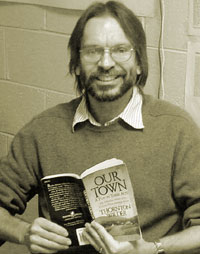 In an article for the Thornton Wilder Society Newsletter, college professor Lincoln Konkle shares his perspective on teaching Thornton Wilder’s work to a new generation of students. Lincoln Konkle is a Professor of English at The College of New Jersey. He has published articles on Wilder and other dramatists such as Tennessee Williams and Edward Albee in journals and books, and is the author of the book-length study titled, Thornton Wilder and The Puritan Narrative Tradition.
In an article for the Thornton Wilder Society Newsletter, college professor Lincoln Konkle shares his perspective on teaching Thornton Wilder’s work to a new generation of students. Lincoln Konkle is a Professor of English at The College of New Jersey. He has published articles on Wilder and other dramatists such as Tennessee Williams and Edward Albee in journals and books, and is the author of the book-length study titled, Thornton Wilder and The Puritan Narrative Tradition.
Teaching Wilder
The 1990s were a Renaissance of Thornton Wilder. There were new scholarly books published, conferences and symposia, major revivals of his plays, publication of plays long out of print, and the publication and performance of plays never before published or performed. To keep the momentum going, the next logical step is to expose Generations X, Y and, as soon as it is literate, Z, to the plays, novels, and essays of one of the most underrated American writers of the twentieth century.
Having been a Wilder aficionado ever since my high school production of The Skin of Our Teeth back in the mid-seventies, I am delighted that I can share my enthusiasm for his works in the English courses I teach at The College of New Jersey, which is just down the road from where Wilder taught French at The Lawrenceville School. Upon my arrival in the fall of 1992 at what was then called Trenton State College, I immediately began looking for opportunities to incorporate Wilder in the various courses I taught. Within my first four years here I assigned Our Town in 20th-century American literature and drama courses, The Skin of Our Teeth in Modern Drama, The Happy Journey to Trenton and Camden in a creative writing course, and The Bridge of San Luis Rey in an introduction to literature course.
Then, in 1997, I had the chance to teach a Major Writer upper-level course on Wilder. My initial excitement was somewhat dampened when I learned that many of his lesser-known works, such as The Eighth Day and The Long Christmas Dinner and Other Plays, were no longer in print, but I was able to teach a full course using Three Plays and three novels then still in print: Bridge, The Cabala, and Theophilus North. I also showed the video of Shadow of a Doubt, the Alfred Hitchcock film for which Wilder wrote the screenplay, and we read some of the great one acts. In the spring of 2001 I am teaching my Wilder course for the second time, and am happy to report that it has been even better because we now have The Collected Shorter Plays in two volumes to use.
Student response in the Wilder courses has been enthusiastic. Among other things, they appreciate Wilder for being one of few 20th-century writers who does not espouse a nihilistic worldview. While I try not to ignore the darker side of his best-known works and the cycle plays, I do point out the more affirmative and spiritual vision of life in his works.
Although I feel as though I’m doing my part to rekindle interest in Wilder through my scholarship and teaching, the good news is that many of my students are English Education majors, which means there is the possibility that they will assign Wilder for some of their classes in high school, junior high, or even elementary school. (Think of what you could do with students reading aloud in class Happy Journey and then writing about their own family trips in the car.) I think Wilder has a lot to offer readers and playgoers in the new millennium. I would be glad to share my syllabus or exchange e-mail (wilder@tcnj.edu) with anyone wanting to know more about how Wilder works at the college level.

